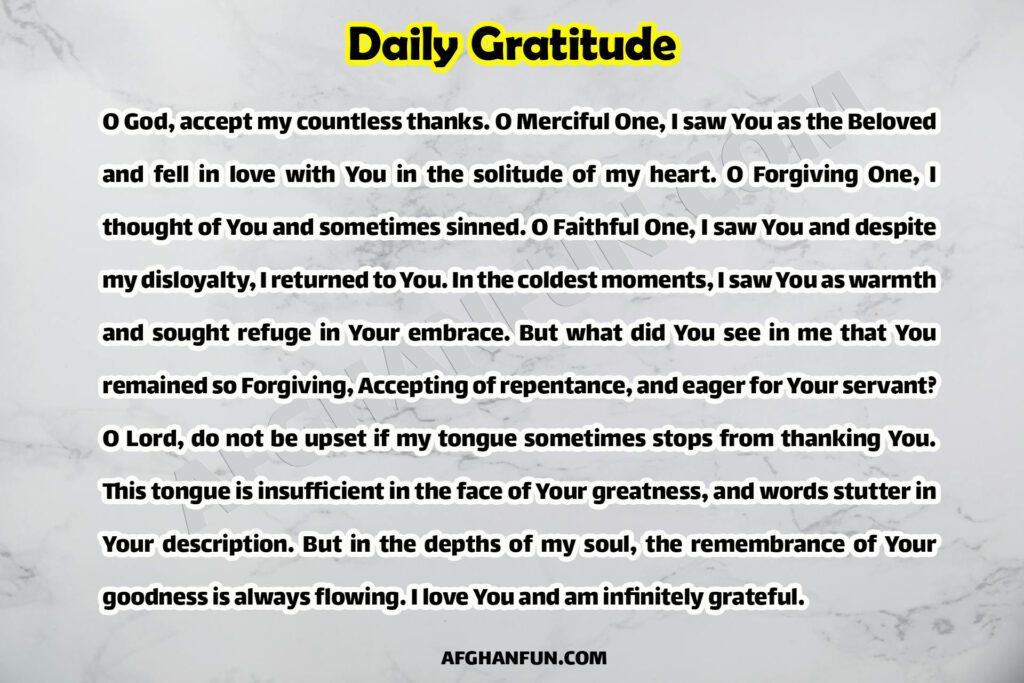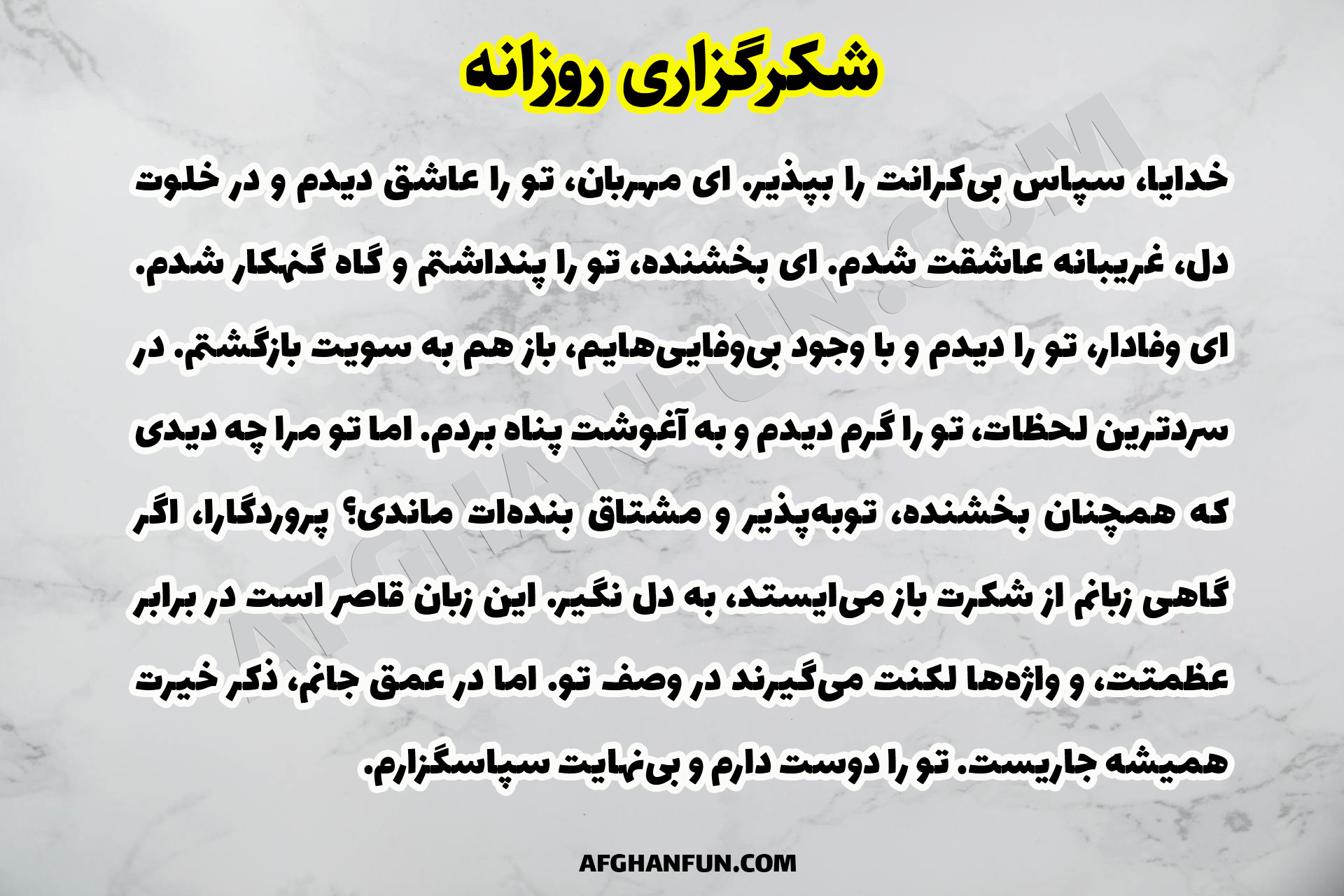
O God, accept my countless thanks. O Merciful One, I saw You as the Beloved and fell in love with You in the solitude of my heart. O Forgiving One, I thought of You and sometimes sinned. O Faithful One, I saw You and despite my disloyalty, I returned to You. In the coldest moments, I saw You as warmth and sought refuge in Your embrace. But what did You see in me that You remained so Forgiving, Accepting of repentance, and eager for Your servant?
O Lord, do not be upset if my tongue sometimes stops from thanking You. This tongue is insufficient in the face of Your greatness, and words stutter in Your description. But in the depths of my soul, the remembrance of Your goodness is always flowing. I love You and am infinitely grateful.
خدایا، سپاس بیکرانت را بپذیر. ای مهربان، تو را عاشق دیدم و در خلوت دل، غریبانه عاشقت شدم. ای بخشنده، تو را پنداشتم و گاه گنهکار شدم. ای وفادار، تو را دیدم و با وجود بیوفاییهایم، باز هم به سویت بازگشتم. در سردترین لحظات، تو را گرم دیدم و به آغوشت پناه بردم. اما تو مرا چه دیدی که همچنان بخشنده، توبهپذیر و مشتاق بندهات ماندی؟
پروردگارا، اگر گاهی زبانم از شکرت باز میایستد، به دل نگیر. این زبان قاصر است در برابر عظمتت، و واژهها لکنت میگیرند در وصف تو. اما در عمق جانم، ذکر خیرت همیشه جاریست. تو را دوست دارم و بینهایت سپاسگزارم.
Эй Худо, шукри беҳисобамро қабул фармо. Эй Меҳрубон, Ман Туро маҳбуб дидам ва дар танҳоии дил, ошиқона ошиқи Ту шудам. Эй Бахшанда, Ман Туро гумон кардам ва баъзан гуноҳ кардам. Эй Вафодор, Ман Туро дидам ва бо вуҷуди бевафоиҳоям, боз ба сӯи Ту баргаштам. Дар сардтарин лаҳзаҳо, Ман Туро гарм дидам ва ба оғӯши Ту паноҳ бурдам. Вале Ту дар ман чӣ диди ки ҳамоно бахшанда, тавбапазир ва муштоқи бандаат монди?
Эй Парвардигор, агар баъзан забонам аз шукри Ту боз меистад, хафа нашав. Ин забон дар баробари бузургии Ту қодир нест, ва калимот дар тавсифи Ту лағжиш мекунанд. Вале дар умқи ҷон ман, зикри некии Ту ҳамеша ҷорист. Ман Туро дӯст медорам ва бениҳоят миннатдорам.
اللهم تقبل شكري اللامتناهي. يا رحمن، رأيتك حبيبي و وقعت في حبك في خلوة قلبي. يا غفور، ظننت بك و أخطأت أحيانًا. يا وفِي، رأيتك و على الرغم من خيانتي، عدت إليك. في أبرد اللحظات، رأيتك دفئًا و لجأت إلى حضنك. لكن ماذا رأيت فيّ لتبقى مغفورًا، متقبلاً للتوبة، ومتلهفًا على عبدك؟
ربنا، لا تغضب إذا توقف لساني أحيانًا عن شكرِك. هذا اللسان قاصر أمام عظمتك، والكلمات تتلعثم في وصفك. لكن في أعماق روحي، ذكر فضلك دائمًا جارٍ. أحبك وأنا ممتن لك إلى ما لا نهاية.
This gratitude is a deeply heartfelt, spiritual reflection on the relationship between the speaker and God. It conveys a profound sense of humility, awe, and love, encapsulating the speaker’s recognition of their imperfections in the face of divine mercy and goodness. Here’s an analysis of its key themes and elements:
1. Acknowledgment of Divine Qualities
The speaker directly addresses God with multiple attributes:
- Merciful (“O Merciful One”)
- Forgiving (“O Forgiving One”)
- Faithful (“O Faithful One”)
This shows that the speaker has an intimate understanding of God’s nature and is recognizing how these qualities shape their relationship. The speaker is aware of God’s consistent presence and generosity, despite their own flaws.
2. Self-Reflection and Humility
The speaker reflects on their own shortcomings:
- They fall in love with God in their heart’s solitude, which conveys a personal connection that is not dependent on external factors.
- They admit to sinning and yet continue to turn to God for forgiveness, acknowledging their disloyalty but also their continual return to God’s mercy.
This creates a sense of vulnerability in the speaker’s relationship with God, where they are aware of their imperfections yet continuously seek reconciliation and intimacy.
3. The Divine’s Unfathomable Mercy
The speaker is moved by the fact that, despite their failings, God remains forgiving, accepting, and eager for their devotion. The question, “What did You see in me that You remained so Forgiving?” highlights a sense of wonder and gratitude for God’s unearned grace. The speaker is humbled by God’s readiness to forgive and embrace them, recognizing that they are undeserving yet always welcomed.
4. Inability to Truly Express Gratitude
The speaker admits that words are insufficient to express the depth of their gratitude:
- The tongue may “stop” or “stutter” in trying to convey thanks, because the divine greatness is beyond human comprehension and language.
- Despite this, the speaker insists that the remembrance of God’s goodness is always present within them, in the very depths of their soul.
This indicates that true gratitude is felt on a spiritual, non-verbal level, beyond the limitations of language.
5. Enduring Love and Gratitude
The closing lines, “I love You and am infinitely grateful,” are simple but powerful. Despite the speaker’s earlier admissions of imperfection, this statement conveys a profound and unwavering love for God. The use of the word “infinitely” emphasizes that their gratitude is limitless, as if acknowledging that no earthly measure can fully capture the depth of their thanks.
6. Tone and Language
The tone is reverent, humble, and emotional. The speaker’s language is filled with a sense of awe and devotion. The repetition of divine qualities (Merciful, Forgiving, Faithful) reinforces the speaker’s relationship with God as one of reliance and trust. The speaker expresses not just gratitude, but love and longing for God, which adds a personal and intimate layer to the prayer.
7. Overall Theme: The Tension Between Imperfection and Divine Mercy
The prayer beautifully captures the tension between human imperfection and God’s boundless mercy. The speaker is keenly aware of their shortcomings (sin, disloyalty, inability to express gratitude properly), but the central focus is on God’s infinite forgiveness, love, and acceptance. It’s a meditation on grace: that despite human flaws, divine mercy is ever-available, and in return, the speaker feels an overwhelming sense of love, gratitude, and devotion.
Conclusion
This gratitude is a tender expression of the human soul’s yearning for divine connection, despite its own flaws. It speaks to the power of God’s mercy to continually draw the soul back in love and reverence, even when words and actions fall short. It beautifully portrays the unending cycle of imperfection, repentance, and divine acceptance that defines a deeply spiritual relationship.











